MTR fare hikes: The inside track
Updated: 2016-06-24 08:41
By Oswald Chan In Hong Kong(HK Edition)
|
|||||||||
According to the operating agreement between the Hong Kong government and MTR Corp (MTRC) in August 2007, the Fare Adjustment Mechanism (FAM) shall be reviewed every five years.
The FAM was introduced after the "rail merger" in 2007, to replace the fare autonomy MTRC hitherto enjoyed.
The first review of the FAM was conducted in April 2013 and sought to review the original fare adjustment formula by introducing a "Profit Sharing Mechanism" and a "Service Performance Arrangement".
That was done in a bid to alleviate the fare burden of Hong Kong residents.
However, the SAR government in March this year asked the MTRC to start FAM review a year earlier than the originally scheduled 2018 amid growing calls to control fare hikes.
The seventh annual hike in a row is due to take effect on June 26.
Fair formula?
Under the Profit Sharing Mechanism, the MTRC will decide the amount to be shared with passengers each year based on different underlying profit levels according to a pre-determined tiered table.
According to the public consultation document of the MTR's FAM review, prepared by the Transport and Housing Bureau and Transport Department in May this year, the MTRC has contributed a total of HK$650 million as sharing amount for fare concessions since 2013.
Also, under the Service Performance Arrangement, different levels of financial penalty will be imposed upon the MTRC based on the nature of train service disruptions caused by factors within the company's control.
Since 2013, MTRC had been fined a total of HK$71.5 million and the amount will be set aside for fare reduction, according to the FAM document.
In other words, since the introduction of the Profit Sharing Mechanism and Service Performance Arrangement in 2013, the total amount set aside for fare reduction to date has reached HK$721.5 million.
Dividend question
It is argued that the Hong Kong SAR government, being the MTRC's largest shareholder, can consider utilizing the dividends received from the railway operator to offset annual fare increases under the FAM.
The Hong Kong SAR government currently owns around 77 percent of the MTRC's shares, according to the Transport and Housing Bureau and Housing Department.
Based on the MTRC's dividend payment proposed and declared, as revealed in its annual financial report, and the fact that the government owns a 77 percent stake, it may be said that the administration has received a total dividend of HK$31.23 billion from MTRC during 2006 to 2016, according to calculations by China Daily.
For and against
Simon Lee Siu-po, assistant dean (undergraduate studies) at the Chinese University of Hong Kong's Business School, criticized the FAM as being ineffective, as fares only increase but not decrease under the formula, adding that the HK$721.5 million utilized to offset fare hikes was nothing compared to the billions of dollars of profit that MTRC has made from 2013 to 2016.
"The dividend the government received from MTRC resembles a transportation tax levied on ordinary Hong Kong residents. The administration should consider giving up at least 50 percent of the dividend it received from MTRC and use the money to offset fare hikes," Lee suggested in an interview with China Daily.
A long-term approach to this issue would be to revamp the whole corporate structure of MTRC, through taking the company private and turning it into a fully government-owned company again. After that, the property segment of the company should be spun off so that the government wholly owns the company, with transportation business as the main focus, Lee suggested.
"After the proposed overhaul, the administration will have the final say over fare hikes. This is in contrast to the current situation, whereas fare hike decisions have to be balanced between public affordability and shareholder interests," Lee told China Daily.
However, not all economists agree with that plan.
Billy Mak Sui-choi, associate professor of Finance and Decision Sciences at Hong Kong Baptist University, said the FAM is objective and fair because the mechanism relies on third-party statistics that MTRC cannot manipulate.
Mak said Hong Kong society should assess the issue more deeply before suggesting solutions, such as using MTRC profits or dividend received by the government to offset fare hikes.
"We have to prove that the current fare level has enabled the MTRC to earn an unreasonably lucrative level of profit. And then we have to study whether there is any legislation that can regulate that MTRC cannot earn such unreasonable profits. Only after clarifying the above issues can we put forward any suggestions," Mak told China Daily.
Mak said requiring MTRC to surrender a portion of profits to subsidize fares will entail the issue of conflicts of interest between consumers and shareholders.
"Requiring the government to surrender its dividends to offset fare hikes should not arouse any corporate governance issue, but the act may itself become an issue of welfare policy, so the administration may need to ponder carefully before taking any action," Mak advised.
oswald@chinadailyhk.com
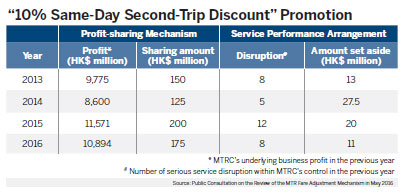
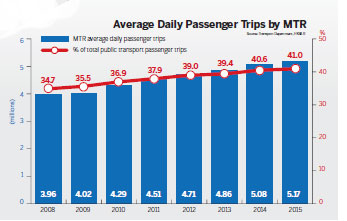
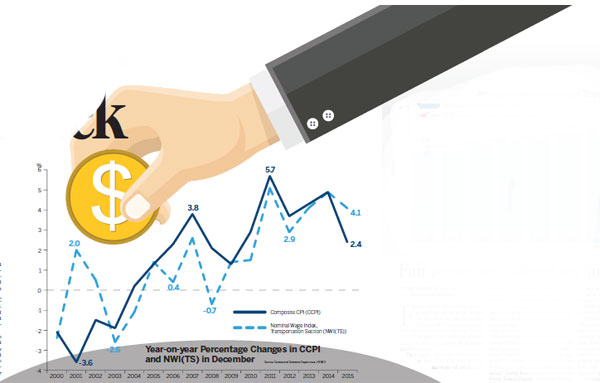
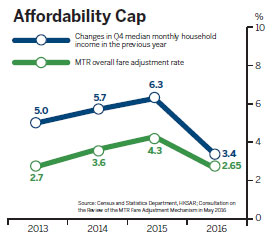
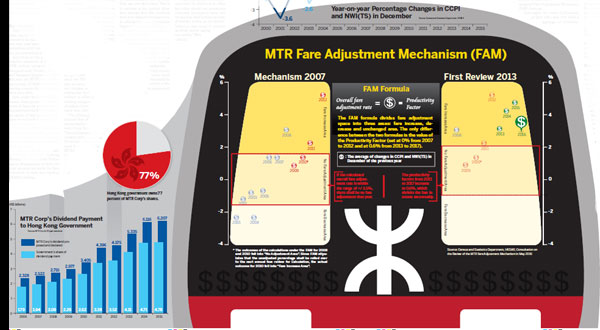
(HK Edition 06/24/2016 page8)